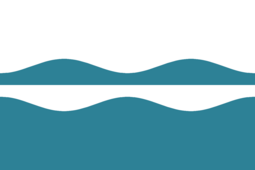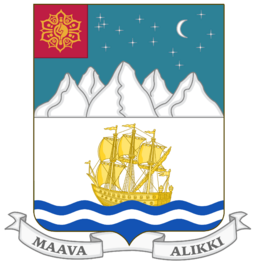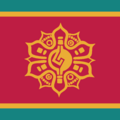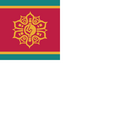Flag and emblem of Mava
 | |
| Use | National flag and ensign |
|---|---|
| Proportion | 2:3 |
| Adopted | 10 April 1978 |
| Design | A horizontal bicolour of white and blue with a countersharged wave mirrored horizontally. |
| Coat of arms of Mava | |
|---|---|
 | |
| Adopted | 10 April 1978 |
| Torse | Green and yellow |
| Blazon | Per fess Azure a representation of a mountain range with moon and stars; and argent a ship Or atop barry wavy of three pieces Azure and Argent. |
| Motto | Maava alikki |
The flag and the coat of arms of Mava are the state symbols of Mava, an unincorporated territorial area of Atitlan. The symbols were adopted by Mava Council in 1978 on 10 April 1978 and were formally proclaimed by Administrator Nakulaq Inamuyak on behalf of Governor Antonio Jose Abarquero on 4 September 1978.
The flag is a public symbol and there are few restrictions on its use. The coat of arms is used to represent the government and may not be used in a private or commercial capacity.
History
Until 1978, Mava had no distinctive flag or coat of arms of its own. From its annexation in 1836 the Atitlanese flag and emblem had been used to signify its sovereignty over the islands. Although a number of private, unofficial flags had been used, none were recognised and none enjoyed continued use. In 1972, following self-government, plans for a new flag were announced by the government, with a competition held to design it. In April 1978 Mava Council approved the adoption of the Kaamatuulikalat ("Our Blue Flag"), designed by college student Aalanaq Kukiatok.
The coat of arms were designed by the Federal College of Heralds in 1977 in Atitlan and formally adopted alongside the flag.
Status and protocol
The flag of Mava is officially recognised as the flag of Mava and may be flown to represent the territory domestically and internationally. The Atitlanese flag may also be flown, but precedence must be given to the flag of Mava. This is different from the states of Atitlan, which must give precedence to the Atitlanese national flag.
The Mavean flag is flown from all government buildings all-year round, although they are only required to be flown on select days as approved by the Council. There are no restrictions on the flag's use by private individuals, who are encouraged to fly the flag, although there are limitations on its use by businesses and enterprises.
There are no laws against flag desecration.
Design and symbolism
The colours and symbols of the flag carry cultural and geographical meanings. The general design, featuring a mirrored wave, symbolises the landscape as seen arriving from the ocean, symbolising the "return home" as well as being a visible reference to the flag's intention to represent the island. The colour scheme also has geographical significance, representing the sea and snow which predominate life in Mava. The design was first described in the Flag Act (Mava) 1978, with more detailed specifications laid out in the National Symbols (Specifications) (Mava) Act 1992.
The aspect ratio of its length to breadth is 3:2, the same as the Atitlanese flag.
Colour scheme
Colors scheme |
Blue | White |
|---|---|---|
| RGB | 66-127-148 | 255-255-255 |
| Hexadecimal | #417F94 | #FFFFFF |
| CMYK | 32, 8, 0, 42 | 0, 0, 0, 0 |
Gallery
See also
- Politics of Mava
- Culture of Mava
External links
- Flag of Mava. International Flag Database

